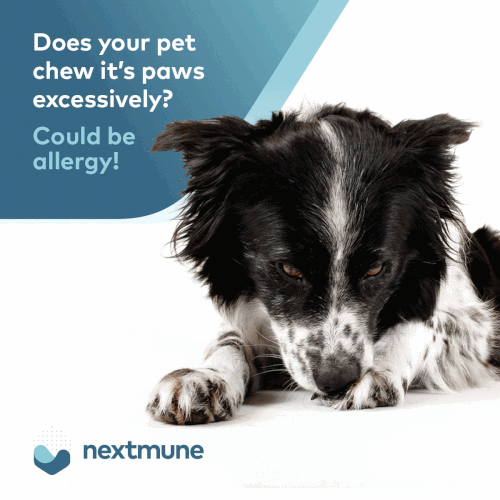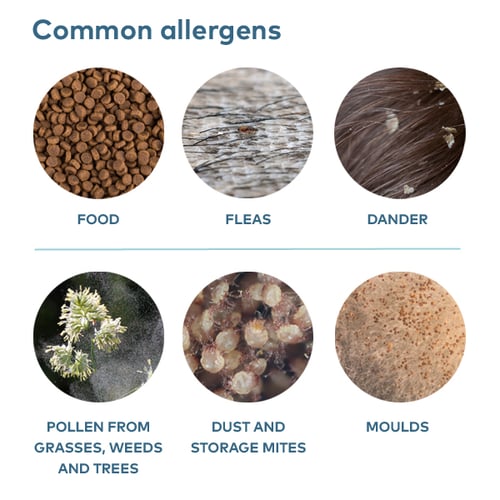Find out if your pet suffers from allergies
Could my pet be allergic?
All pets scratch, lick, bite, and rub. However, it should never interrupt activities such as playing or eating, cause hair loss, skin damage or be often enough that it causes discomfort for your pet and for you. Frequent or constant scratching, licking, biting, scooting, and/or rubbing are most often signs of an allergic skin disease. If your pet shows signs of allergy it is important to seek treatment as soon as possible. If left untreated it can become more serious and lead to complications, such as skin and ear infections, thickened, red and/or darkened skin, hair loss, odour and even intestinal problems, like vomiting and diarrhoea. It’s important to talk to your vet about getting effective, lasting treatment.
Did you know?

1 out of 5 pets are allergic and itching is the number one reason for veterinary visits, yet many pets continue to suffer because symptoms can be associated with common behavior and pet owners unfortunately are not aware of severity of the problem.
How to recognise allergy?
Does your pet show any of these signs?
It could be allergy!
What to do if it is allergy?
Not all itchy skin, scratching or ear problems are due to allergies. There are other diseases that can cause similar signs. For that reason your vet will start by excluding all other potential causes, such as fleas, scabies, infections, etc. If the allergy symptoms remain after excluding or treating other causes, the next step is to exclude the possibility of food allergy and identify which allergens may be causing the allergy, through a simple and quick blood test.
This is a fundamental step, without knowing which allergens are causing the problem it is not possible to avoid them where you can and treat your pet.
How to treat allergy?
Unfortunately, there is no magic cure for allergy. Often, the goal is not to cure the disease, but to manage the symptoms so that the quality of life for your pet is not impacted to such a degree that they suffer. This can be best achieved through a multi-modal treatment approach which involves combining different treatment options. Managing allergy can be achieved through:
Regular flea treatment
Itch blocking medication
Topical shampoos, sprays, foams & spot-on's that restore skin barrier function and soothe itch
Medicated shampoos, wipes, foams, sprays & spot-on's that help prevent skin issues
Ear cleaners that promote long-term aural hygiene
A low allergen diet
Anti-dust environmental sprays
If your pet has a skin-related allergy, the only long-term treatment that can address the root cause of your pet’s allergy is Immunotherapy (also called allergen-specific immunotherapy). Immunotherapy is a custom-made, safe and an effective treatment for your pet that will stop its symptoms from affecting its health, comfort and quality of life.
Supporting resources
Any Questions?

IF YOUR PET HAS ALLERGY SYMPTOMS YOUR VET CAN HELP
Key facts to remember:
- Allergy is a very common disease in dogs and cats
- Be aware of any sign that might be indicative to allergy. Most of these signs can be considered normal behaviour so request an allergy check up with your vet
- It is important to identify which allergens are the source of the allergy so they can be avoided and your pet can be treated
- The first choice for treating allergy is immunotherapy, a custom-made, all-natural treatment which is safe, effective and gives long-lasting itchy relief
Site map Privacy police Terms of use
All trademarks are property of Nextmune Animal Health or a related company or a licensor unless otherwise noted.
@2022 Nextmune UK Ltd. All rights reserved.




